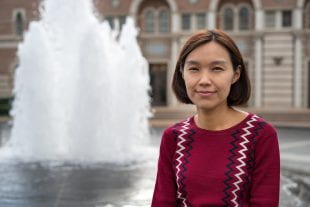EXPERT ALERT
David Ruth
713-348-6327
david@rice.edu
Jeff Falk
713-348-6775
jfalk@rice.edu
Uber/Lyft drivers’ strike unlikely to increase pay, expert says
May 8 work stoppage to take place in 8 major US cities
HOUSTON – (May 1, 2019) – Next week, drivers for ride-sharing companies Uber and Lyft plan to clear the streets of their cars in eight major U.S. cities in an effort to raise their minimum wage and improve working conditions.
Joyce Beebe, a fellow in public finance at Rice University’s Baker Institute for Public Policy, has recently published research on the “sharing economy” and is available to comment on the planned May 8 strike in Los Angeles, Boston, Chicago, Minneapolis, Philadelphia, San Diego, San Francisco and Washington, D.C. The drivers are seeking a minimum wage of $28 an hour, which they say amounts to about $17 an hour after gas and other expenses.
“Uber and Lyft are unlikely to increase drivers’ minimum wage to $28 simply because of the May 8 strike,” Beebe said. “The success of their business models attributes, in a large part, to the independent contractor classification of their drivers.”
Uber is set for an initial public offering (IPO) this month that could value the company at more than $90 billion.
“The companies may offer to increase drivers’ pay on a one-time bonus basis or in small increments, but remember, although Uber is a tech unicorn, it is still deep in red, losing over $1 billion in 2018,” Beebe said. “After the IPO, Uber will face pressure from investors and the market to show financial improvements, which makes substantial increases in drivers’ pay unlikely.
“Drivers are more likely to get the $28 hourly wage by going through the legislative process, following the (New York City) model,” she added. “However, this is also going to be a long-term battle because Lyft already filed a lawsuit against NYC.”
Still, Beebe is not surprised drivers decided to strike.
“It is potentially inspired by the success of New York City’s driver minimum wage law enacted recently $27.86 gross and $17.22 after fees and expenses) and the timing of Uber’s impending IPO,” she said.
“The fundamental issue is that the drivers are classified as independent contractors instead of employees, a position Uber defended fiercely in court,” Beebe said. “Platform companies typically can save 20-30% by hiring workers as independent contractors instead of employees, because they are not obligated to offer overtime pay, provide benefits, withhold income taxes or pay the employer share of Social Security and Medicare taxes (7.65%). Drivers, on the other hand, not only have to pay the full 15.3% of the self-employment taxes (and) federal and state income taxes, they also have to pay for their own repair and maintenance for their vehicles and other necessary expenses. Although the drivers enjoy flexibility, they also increasingly experience income and job instability.”
Prior to joining the Baker Institute, Beebe was an international tax director at Grant Thornton LLP and an economist at Deloitte Tax LLP, specializing in transfer pricing. Beebe conducted valuation of intangible properties and cost-sharing analyses, advised on IRS audit defense strategies, performed valuation and debt capacity analyses for intercompany fixed income securities and prepared transfer pricing due diligence and exposure analyses for merger and acquisition purposes. She is a chartered financial analyst (CFA) charterholder and a member of the CFA Institute and CFA Society Houston.
Beebe received a bachlor’s degree in public finance from National Chengchi University in Taiwan, a diploma from the Stockholm School of Economics and a doctorate in economics from Rice.
The Baker Institute has a television and radio interview studio available.
For more information or to schedule an interview with Beebe, contact David Ruth, director of national media relations at Rice, at david@rice.edu or 713-348-6327.
-30-
Additional information:
Beebe previous research: “How Should We Tax the Sharing Economy?”
Beebe bio: https://www.bakerinstitute.org/experts/joyce-beebe/
Photos for download:
https://news2.rice.edu/files/2019/05/uber-lyft.jpg
Photo credit: 123rf.com/Rice University
https://news2.rice.edu/files/2019/05/20181030_joyce-beebe_martin_-2.jpg
Photo credit: Brandon Martin/Rice University
Follow Rice News and Media Relations on Twitter @RiceUNews.
Follow the Baker Institute on Twitter @BakerInstitute.
Founded in 1993, Rice University’s Baker Institute ranks among the top three university-affiliated think tanks in the world. As a premier nonpartisan think tank, the institute conducts research on domestic and foreign policy issues with the goal of bridging the gap between the theory and practice of public policy. The institute’s strong track record of achievement reflects the work of its endowed fellows, Rice University faculty scholars and staff, coupled with its outreach to the Rice student body through fellow-taught classes — including a public policy course — and student leadership and internship programs. Learn more about the institute at www.bakerinstitute.org or on the institute’s blog, http://blogs.chron.com/bakerblog.
Located on a 300-acre forested campus in Houston, Rice University is consistently ranked among the nation’s top 20 universities by U.S. News & World Report. Rice has highly respected schools of Architecture, Business, Continuing Studies, Engineering, Humanities, Music, Natural Sciences and Social Sciences and is home to the Baker Institute for Public Policy. With 3,962 undergraduates and 3,027 graduate students, Rice’s undergraduate student-to-faculty ratio is just under 6-to-1. Its residential college system builds close-knit communities and lifelong friendships, just one reason why Rice is ranked No. 1 for lots of race/class interaction and No. 2 for quality of life by the Princeton Review. Rice is also rated as a best value among private universities by Kiplinger’s Personal Finance.


